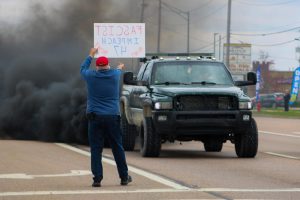Media-less tragedy needs support
October 17, 2005
Did you even know 25,000 people are dead and 63,000 are injured?
These are the latest casualty numbers from the 7.6 magnitude earthquake which struck Pakistan Oct. 8 according to Maj. Gen. Shaukat Sultan, a spokesman for the Pakistani president.
Surely with 25,000 people dead we would see continuous coverage on all the major cable news channels. Reporters would flock to the scene to cover the tragedy of humanity. Especially since this tragedy is an ongoing one.
There have been multiple aftershocks since the initial quake, including a 5.6 magnitude aftershock as recently as Thursday.
Yet on Thursday night, there were no headlines about the earthquake to be found on CNN’s homepage, and only small one-line blurbs on MSNBC and Fox News Web sites.
The lack of coverage for such a catastrophe is saddening but not surprising.
How many people can honestly say they remember much about the 2003 earthquake in Iran that killed 26,000 people or the 2001 Indian earthquake that killed as many as 13,000?
These are very recent events, but are no more than vague memories in the minds of many Americans.
Our media must stop treating foreign catastrophes as less important than those which strike America. The loss of human life is the loss of human life; whether American, Pakistani, Indian or any other nationality.
Despite the lack of coverage by the media, the American government has done a fine job of assisting in the rescue efforts – as they almost always do.
The day after the earthquake, President Bush met with the deputy-chief of the Pakistani embassy in Washington to offer condolences, cash and rescue supplies.
The U.S. has also sent in military cargo planes, based out of Afghanistan, filled with food and other emergency items to be parachuted into the affected regions, according to an Associated Press article.
The entire world has helped with the aid. The United Nations launched an appeal on Oct. 11 for $272 million in foreign aid to be sent to Pakistan and have already set up multiple relief shelters in the area.
Clearly the governments of the world, including our own, are doing their part to help the people of Pakistan.
The attitudes of the public towards foreign tragedies need to become more in line with the actions of our government.
During the Hurricane Katrina tragedy there were countless food and money drives on campus. People were offering everything they could – from the goods in their pantry to the clothes in their closet. Nothing was too much. I have yet to see any drives here on the NIU campus, nor have I seen any stars on my TV helping with pledges to aid the victims of the Pakistani earthquake.
I am in no way making light of the true American spirit exhibited after the Hurricane Katrina catastrophe. I do, however, wish to see the American spirit spread to helping other countries around the world in times of need.
There is no question the American reputation across the world is in need of serious repair. Perhaps if the American public, not the government, were to find the charity in their hearts once again to give to those in need across the world they could win over the hearts and minds of the world.
I have the utmost faith in the American spirit and unshakable desire to give to those in times of great need. I have no doubt that, were the American public to see the true amount of devastation elsewhere, they would act just as they did after our recent tragedies at home.
Charity, however, starts with knowledge. For Americans to care about tragedies abroad they must first know about tragedy.
Seeing the devastation on our television screens and our computer monitors is the first step towards finding empathy for the victims of tragedy and that’s where our media comes in.
Columns reflect the opinion of the author and not necessarily that of the Northern Star staff.







